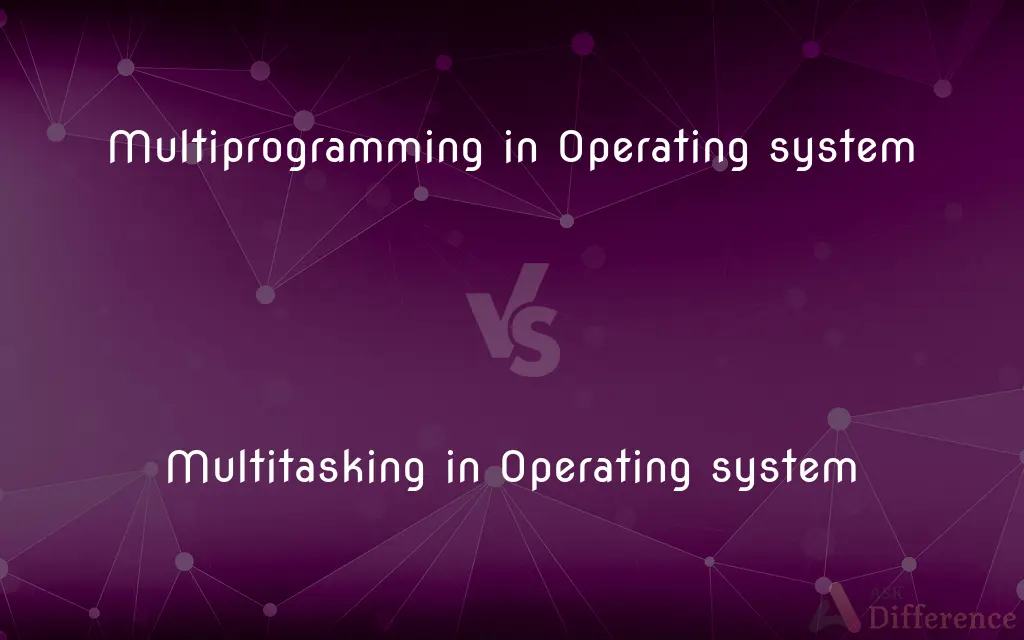Multiprogramming in Operating system vs. Multitasking in Operating system — What's the Difference?
Edited by Tayyaba Rehman — By Fiza Rafique — Published on December 30, 2023
Multiprogramming in Operating system involves managing multiple programs in memory to maximize CPU utilization, while Multitasking in Operating system refers to the concurrent execution of multiple tasks or processes.

Difference Between Multiprogramming in Operating system and Multitasking in Operating system
Table of Contents
ADVERTISEMENT
Key Differences
Multiprogramming in Operating system is a technique where multiple programs are loaded into memory simultaneously. The primary goal of Multiprogramming in Operating system is to ensure that the CPU always has a job to execute, thus maximizing its utilization. On the other hand, Multitasking in Operating system involves the operating system executing several tasks or processes concurrently, rather than sequentially.
Multiprogramming in Operating system doesn't necessarily mean multiple tasks are being executed at the same exact time. Instead, it ensures that while one task waits (like for an I/O operation), another can use the CPU. Conversely, Multitasking in Operating system can be seen in scenarios where a user might be listening to music (one task) while typing a document (another task) simultaneously.
The fundamental difference between Multiprogramming in Operating system and Multitasking in Operating system lies in their goals and implementation. While the former seeks to optimize CPU utilization by having multiple programs in memory, the latter aims for efficient task management, allowing users or systems to perform multiple operations at the same time.
Multiprogramming in Operating system can be viewed as a precursor to Multitasking in Operating system. The evolution from simple multiprogramming to multitasking provided users with the illusion of parallel execution and improved system responsiveness. Multitasking in Operating system, especially in modern graphical user interfaces, allows users to switch between tasks seamlessly.
Both Multiprogramming in Operating system and Multitasking in Operating system play crucial roles in modern computing. Multiprogramming optimizes system resources, ensuring hardware isn't idle. Multitasking in Operating system, however, enhances user experience by allowing simultaneous task execution and quick task switching.
ADVERTISEMENT
Comparison Chart
Primary Objective
Maximize CPU utilization by managing multiple programs in memory.
Allow concurrent execution of multiple tasks or processes.
Execution Mode
Sequentially runs tasks from memory, but not necessarily at once.
Can execute tasks seemingly in parallel or truly parallel with multi-core systems.
User Experience
No direct interaction; more about system efficiency.
Allows users to perform and switch between multiple tasks simultaneously.
Dependency on I/O
A task waits if it needs I/O, allowing other tasks to use the CPU.
Tasks can run simultaneously, with each having its own slice of CPU time.
Evolutionary Context
Can be seen as a precursor to multitasking.
Advanced form, providing illusion of parallel execution.
Compare with Definitions
Multiprogramming in Operating system
Multiprogramming in Operating system ensures the CPU always has a job to execute from the main memory.
Multiprogramming in Operating system enhances system throughput by managing multiple tasks in memory.
Multitasking in Operating system
Multitasking in Operating system refers to the ability of the OS to manage multiple tasks concurrently.
Because of Multitasking in Operating system, you can listen to music while typing a document.
Multiprogramming in Operating system
Multiprogramming in Operating system is a technique where multiple programs reside in main memory at once.
With Multiprogramming in Operating system, a system can switch to another task when one waits for I/O.
Multitasking in Operating system
Multitasking in Operating system gives the illusion of simultaneous task execution through rapid context switching.
With Multitasking in Operating system, users feel as though several applications run at the same time.
Multiprogramming in Operating system
Multiprogramming in Operating system aims to optimize CPU utilization by minimizing idle time.
By using Multiprogramming in Operating system, the CPU can process another task while one is waiting.
Multitasking in Operating system
Multitasking in Operating system is the capability of an OS to handle and switch between tasks rapidly, giving an appearance of parallelism.
Due to Multitasking in Operating system, handling emails, browsing, and calculations can all happen almost simultaneously on a computer.
Multiprogramming in Operating system
Multiprogramming in Operating system involves managing several jobs in memory, ensuring the CPU is never idle.
Efficiency is improved with Multiprogramming in Operating system as multiple jobs are handled seamlessly.
Multitasking in Operating system
Multitasking in Operating system enhances user experience by allowing rapid switching between tasks.
Multitasking in Operating system allows you to quickly switch from your email client to your web browser.
Multiprogramming in Operating system
Multiprogramming in Operating system operates on the premise that while one job waits, another can be executed.
To maximize CPU use, Multiprogramming in Operating system manages job execution based on priorities.
Multitasking in Operating system
Through Multitasking in Operating system, users can run and manage multiple applications seemingly at once.
One of the main advantages of modern computers is the Multitasking in Operating system, letting users work on various tasks seamlessly.
Common Curiosities
How does Multitasking in Operating system differ from Multiprogramming in Operating system?
Multitasking appears to execute tasks simultaneously, while Multiprogramming focuses on maximizing CPU efficiency.
Can Multiprogramming in Operating system and Multitasking in Operating system coexist?
Yes, they often coexist in modern operating systems to maximize efficiency and enhance user experience.
Is simultaneous execution a feature of Multiprogramming in Operating system?
Not necessarily; it ensures multiple programs are in memory for efficient CPU use.
Why is Multiprogramming in Operating system important?
It ensures the CPU always has a program to process, reducing idle time.
How does Multitasking in Operating system achieve the illusion of simultaneous execution?
Through rapid context switching between tasks.
Is Multiprogramming in Operating system more about hardware efficiency?
Yes, it's primarily about maximizing the efficiency of the CPU.
How does Multitasking in Operating system enhance user experience?
It allows users to switch rapidly between tasks, making it seem like multiple tasks are running at once.
Does Multitasking in Operating system mean multiple tasks are executed at the exact same time?
No, it gives the illusion of simultaneity through rapid context switching.
What does Multiprogramming in Operating system mean?
It's a technique where multiple programs reside in memory to improve CPU utilization.
Does Multiprogramming in Operating system involve frequent context switching?
Not as frequent as in Multitasking. Its main goal is efficient CPU use.
Which one, between Multiprogramming in Operating system and Multitasking in Operating system, is more user-centric?
Multitasking, as it enhances user experience by appearing to run tasks concurrently.
What's the main goal of Multiprogramming in Operating system?
To maximize CPU utilization by minimizing its idle time.
Can Multitasking in Operating system lead to system overhead?
Yes, frequent context switching can introduce overhead.
Share Your Discovery

Previous Comparison
Money Market vs. Capital Market
Next Comparison
Amped Outdoors vs. Dakota LithiumAuthor Spotlight
Written by
Fiza RafiqueFiza Rafique is a skilled content writer at AskDifference.com, where she meticulously refines and enhances written pieces. Drawing from her vast editorial expertise, Fiza ensures clarity, accuracy, and precision in every article. Passionate about language, she continually seeks to elevate the quality of content for readers worldwide.
Edited by
Tayyaba RehmanTayyaba Rehman is a distinguished writer, currently serving as a primary contributor to askdifference.com. As a researcher in semantics and etymology, Tayyaba's passion for the complexity of languages and their distinctions has found a perfect home on the platform. Tayyaba delves into the intricacies of language, distinguishing between commonly confused words and phrases, thereby providing clarity for readers worldwide.















































